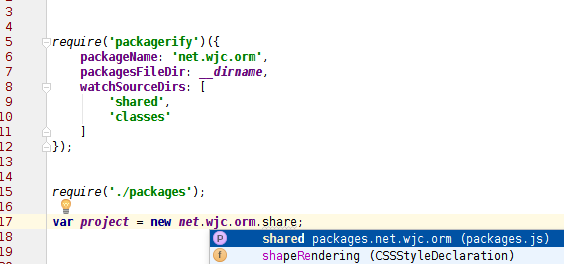node-packagerify
Make it possible to use 'Java-style' package import instead of using require. Add require('./packages.js') to your application root file and everywhere in the project you can use package name instead of require('./../../../someDir/someSubDir/module');
NO MORE:
var module = require('./../../../someDir/someSubDir/module')
USE PACKAGERIFY: var module = your.package.name.somePackage.someSubPackage.module;
Packagerify generates packages.js in specified folder. You have to include it into your main application file. It will inject generated packages object into global namespace. Why to generate this file and not to use Proxy and so on? Just because I want my IDE make autocompletion when I type the package name;
As additional benefit - you could enumerate modules in package without filesystem reading. Just use native JS.
for(var i in com.your.pack.module) {
...
}
(Especially useful for AngularJS when registering controllers,directives, etc);
Note: for client-side usage RequireJS system is a must for now.
###Please, note:
If you build your code with BabelJS v6, you must use babel-plugin-add-module-exports plugin. You can download it here https://www.npmjs.com/package/babel-plugin-add-module-exports
From 0.0.7 version the grunt task included. So, to packagerify your project simply add to Gruntfile.js packagerify config:
Example config
Gruntfile.js
grunt.initConfig({
packagerify: {
default: {
options: {
packageName: 'com.example.packagename',
packagesFileDir: '',
watchSourceDirs: ['src'],
ignored: [**/assets]
}
}
}
});
grunt.loadNpmTasks('packagerify');
grunt.registerTask('default', ['packagerify']);
- packageName - dot-separated string (usually your domain in reversed order + package name). For example: com.google.myPackage;
- packagesFileDir - [not required] path to folder where packages.js file will be created (By default - the Gruntfile.js folder);
- watchSourceDirs - string or array of strings. Each string is a relative path to packagesFileDir. Each watched directory will populate its sources to packages.js
- ignored - anymatch-compatible expression matching files or paths
Assuming we have project structure:
root_dir/src/lib/MyClass1.js
root_dir/src/lib/MyClass2.js
Grunt task setup:
packagerify: {
default: {
options: {
packageName: 'com.example.pack',
watchSourceDirs: ['src'],
}
}
}
packages.js injects in the global namespace this files and they could be accessed in next way:
var MyClass1 = com.example.pack.lib.MyClass1
var MyClass2 = com.example.pack.lib.MyClass2
For ES6:
class MyDescendantClass extends com.example.pack.lib.MyClass2 {
...
}
No 'require('.........')' needed!
First step
npm install packagerify
Second step
- setup grunt config as showed earlier
OR
- use Packagerify class directly (this will also start file watcher):
var Packagerify = require('packagerify');
var packagerify = new Packagerify({
packageName: 'com.example.packagename',
packagesFileDir: '',
watchSourceDirs: ['src']
});
##Whats new
v0.0.10:
- remove packagerify module dependence from packages.js to avoid packing entire packagerify module with webpack and similar
v0.0.9:
- add "ignored" option
v0.0.8:
- add grunt task "packagerify"
